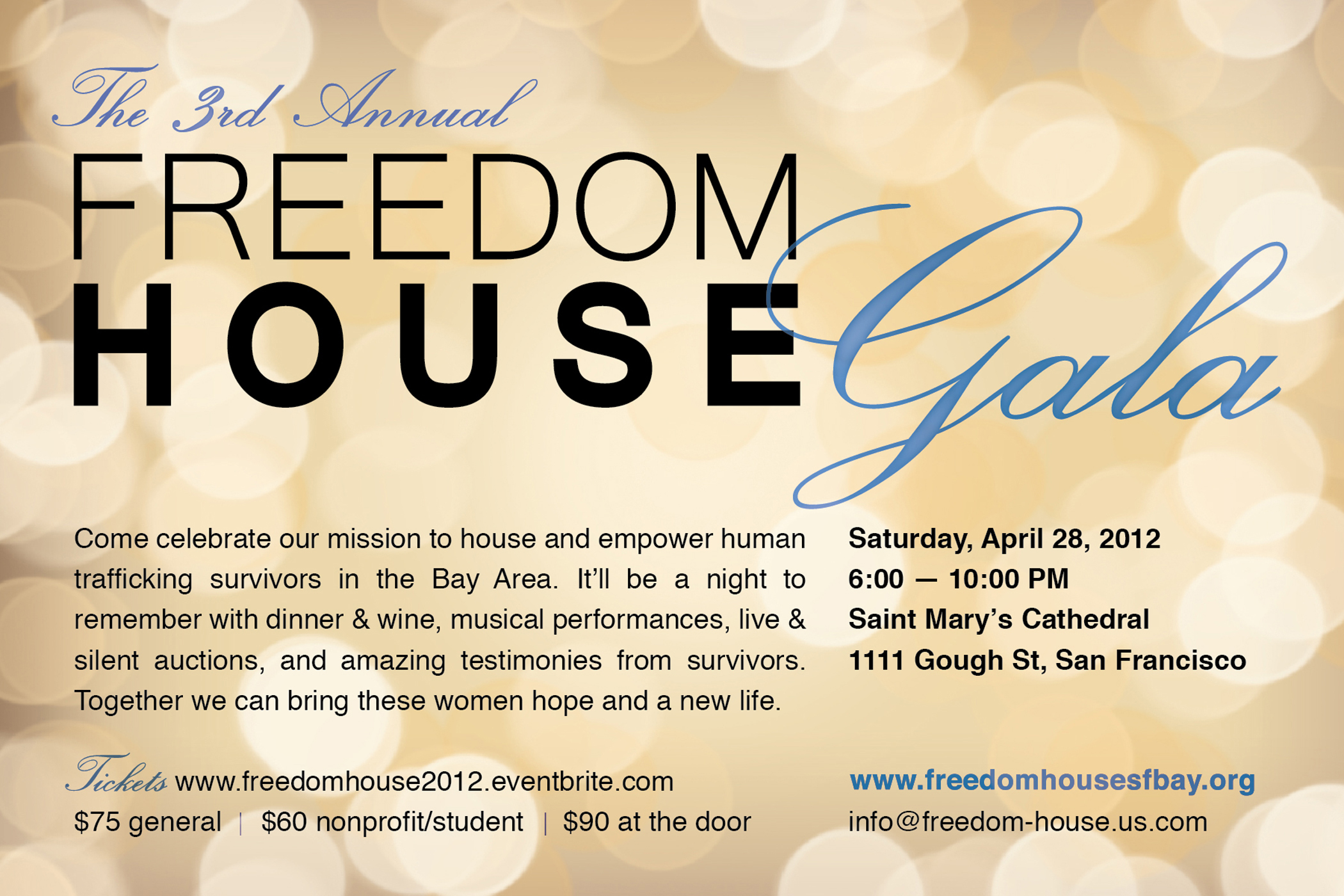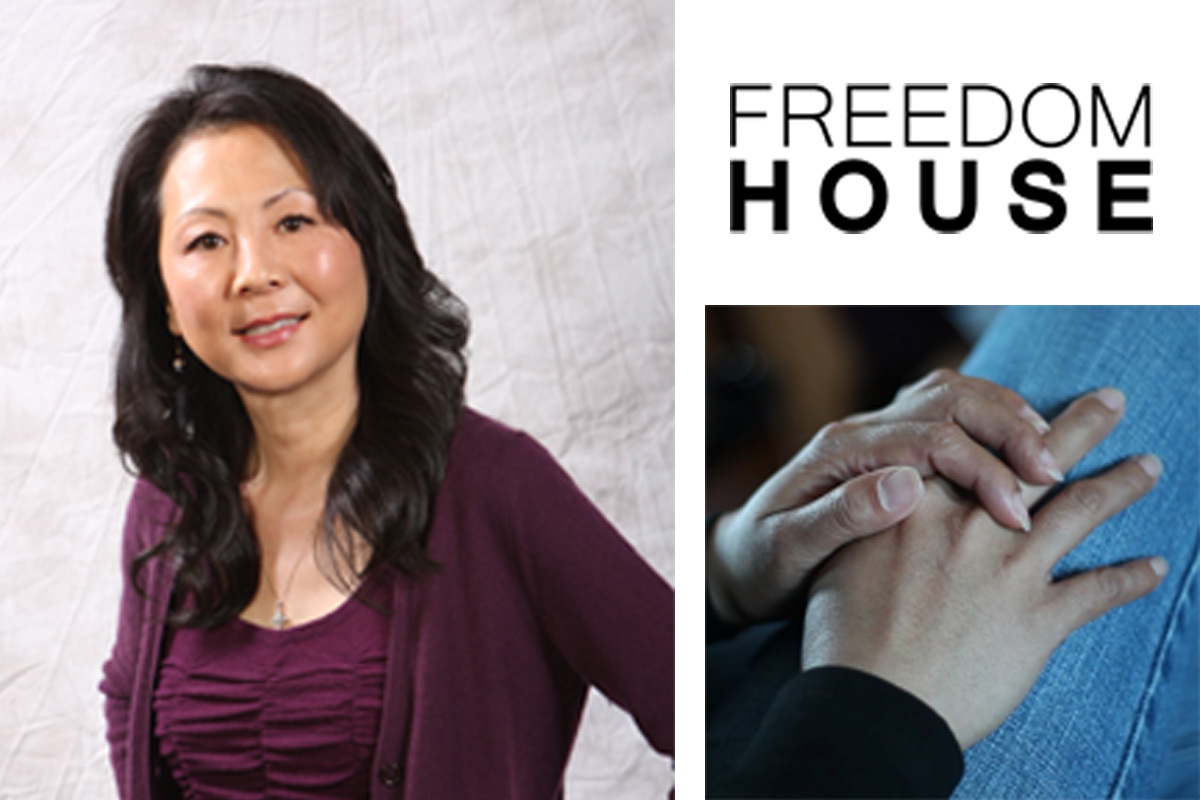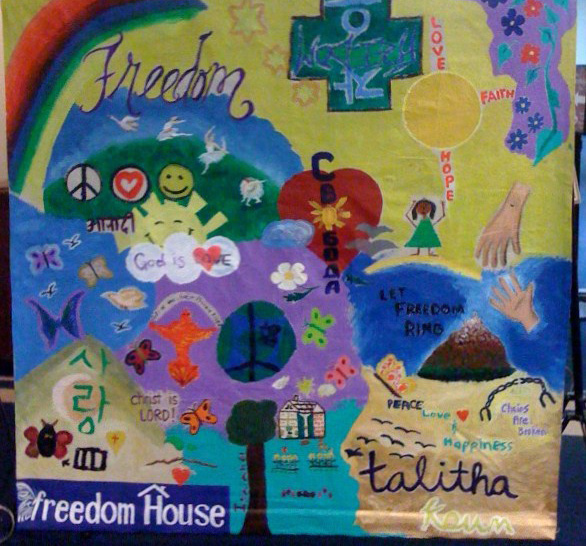
When I met Jaida Im founder of Freedom House a few weeks ago, I was struck not only by her passion for helping human trafficking survivors, but also her absolute faith in the work that she's doing through her shelter. On Saturday, April 28, Freedom House will host a gala at Saint Mary's Cathedral in San Francisco to celebrate all they have achieved these past few years and to raise awareness about this important cause. Jaida kindly shared her incredible personal story, details on the critical work they're accomplishing at Freedom House and redemptive stories from some of the survivors she's helped to transform their lives.

Nicki Richesin: Congratulations to you on your great success with Freedom House. Through your hard work, passion and determination, you have created the first and only shelter in Northern California for adult female survivors of human trafficking. How did you find a way to restore these women's human dignity?
Jaida Im: Thank you! It's been an amazing and humbling journey for me. There have been a lot of ups and downs, but I feel a lot of confirmation in this work and see the impact it's making in the lives of these women. We hope to restore each survivor's dignity by accepting her for who she is without any judgment and giving her unconditional love. I recently had lunch with one of our residents when she was about to graduate from the Freedom House program. She had tears in her eyes as she expressed how grateful she was to receive so much care and support. She said to me: "I think this is what you call 'unconditional love,' and I've never had that before."
NR: In 2008, you experienced an unbelievable miracle in your life that inspired you to create Freedom House. Could you describe how you went from utter despair after long-time suffering to a renewed sense of purpose in your life?
JI: I started to question how I was to share the newfound joy and the freedom I experienced. I began to search for opportunities to serve. Then I became aware of the needs of those who were suffering and held captive against their will through human trafficking. Once I learned more about the issue, I simply couldn't turn away.
In early 2009, I attended a human trafficking forum in San Francisco that was convened to address the local issues around human trafficking. At this forum, law enforcement and community partners confirmed that there was an urgent and major need for shelters for survivors of human trafficking. It was then that I decided to found Freedom House to meet the needs of these survivors.
Survivors of human trafficking are modern day slaves living without freedom. They are kept in bondage. Even when they are rescued from their perpetrators, they are not truly freed since they have nowhere to turn to for help. As I was given a second chance at life, my vision was that Freedom House would be a home that would offer survivors refuge and a new life with hope and freedom.
NR: I read the moving Survivor Stories on the Freedom House website. Many of them wrote of feeling empowered after graduating from your recovery program at Freedom House. How did you manage to instill such confidence and boost their self-esteem after the terrible abuse they have suffered?
JI: Our goal is to empower our residents to start a new life. The first step in the journey is emotional recovery. When the survivors come to our shelter, they are severely traumatized and emotionally unstable. We provide individual case management and work closely with each woman to meet her specific needs. This includes connecting to much needed resources, including social service, legal, medical, psychological, and spiritual.
Once the women are ready to take the next step, we help them develop a plan to meet their goals, whether it's to reunite with their family, to learn English and start a life here, or to find a job and become financially self-sufficient. We've seen so many survivors come out of a very dark place into a place where they are hopeful and pursuing their dreams.

NR: Could you share a survivor's story that perhaps moved you the most profoundly?
JI: I still remember meeting one of our very first residents. One night we were asked by an ER doctor to go to the hospital to help rescue a woman who had been trafficked and ended up in the hospital due to physical and mental abuse. When I arrived, I found a young woman lying in a hospital bed with scars and bruises from multiple beatings and abuse by her trafficker. Her eyes were filled with so much fear, sadness, and helplessness. It was daunting and heartbreaking.
We brought her to Freedom House and provided her with much needed care and support. Over the course of a little less than a year, she transformed from a person who was terrified, anxious, and depressed into a confident, caring, happy, and self-sufficient woman with new hopes for her future. She successfully reunited with her family and now has plans to become a nurse. It's stories like these that keep me going and remind me of the importance of the work that we do.
NR: Your work at Freedom House is complicated by the women's circumstances (the vicious cycle of abuse, cultural shame, and often times they are far away from their home). They require cultural sensitivity and care so they can heal and trust again. You also provide counseling and therapy to help them start their lives over again. What's the main obstacle you have found in the recovery process?
JI: Transformation doesn't happen overnight for these women. The recovery process is long and challenging. Human trafficking is a terrible crime that completely strips away a person's dignity, and it takes a lot of care, support, and grace to put the pieces back together.
Because of the nature of what they've been through, our residents do act out, and there are conflicts within the house. It takes a lot of TLC to help stabilize the women and to help them learn to trust others because they may have never had anyone they could count on before. Over time, the women come to form bonds with the staff and volunteers and with one another. Many of them have described Freedom House as a family.
NR: I'm sure readers would love to hear about a survivor's success story who has flourished as a result of her time at Freedom House. Without sharing too many personal details, would you kindly describe one success story?
JI: There was a young woman who was trafficked to the U.S. from her country under the promise of making good money and living a good life. Once she got here, she was forced to be a house slave. She worked 12 to 14 hours a day in a poor working environment and slept in a cell-like space. When she arrived at Freedom House, she was extremely depressed and withdrawn. She wouldn't eat and had frequent crying spells. She was afraid to talk and kept her distance from everyone at the house.
After a few weeks and some much-needed rest, she started to open up. She began to accept support from staff and the volunteers. She worked with a legal team to process her T-visa and work permit. She gradually started to participate in some group activities. She began to have hope. It warmed my heart to see her laugh, to be filled with energy and determination. We helped her to find a job and her own apartment, and after a year with us, she successfully graduated from the Freedom House program.
Two weeks ago, she visited Freedom House and joined our weekly family dinner night. She had a wonderful time with the other residents and shared encouraging words with them. She is now a role model for others who hope to move on and start a new life. I have been blessed to witness her courage and her determination to succeed. She has been an inspiration to me, and to our staff, volunteers and residents alike.
NR: On April 28, you will celebrate many blessings and triumphs at the Freedom House Gala. What does this event mean to you personally and what do you hope to achieve in the future?
JI: It is an answered prayer. The venue we are having the Gala at is where I stood two years ago at an event raising awareness about domestic violence. I remember wishing that someday Freedom House could be there celebrating and bringing the community together to fight against injustice and bring hope to survivors of human trafficking.
This year, we will continue to build on our successes and expand our reach. We're passionate about raising awareness about human trafficking and the need for aftercare for survivors. Our goal is to expand and to open more homes. There's a huge need out there, and we plan to grow to be able to meet the unanswered needs of survivors in the Bay Area and beyond.
NR: How can people get involved with Freedom House?
JI: We depend so much on the generous support of the community. We have volunteers that provide essential support to the residents and advocates that help to spread awareness about the issue. We're supported by individuals, groups and churches that give financially or bless us with their prayers.
Each one of us has a role in this movement, and it's as a community that we will make a difference in these women's lives. I encourage every concerned person to get involved. It doesn't take a special gift or talent to make a difference. Just your willingness and compassion are instrumental in giving hope to the hopeless and a voice for the voiceless.
NR: After all these years of working with trafficking survivors and a community that supports them, what have you learned about this world that gives you hope?
JI: Oftentimes we do nothing not because we lack compassion but because we are overwhelmed by the size of the problem and don't know where to begin. We alone are not expected to eliminate human trafficking, but when we work together, we can make a real impact. I'm so thankful for the many people who have graciously given their time, resources, and prayers to our cause. Freedom House wouldn't exist without these individuals.
There are many challenges and obstacles, but I have faith. Even though this is a difficult issue and the road to recovery is not easy, I have seen amazing successes and transformation in the lives of survivors. I know that together we can fight this horrific crime and make a difference--one human being at a time.
For more information on Freedom House and to get involved, visit www.freedomhousesfbay.org.
Attend the Freedom House Gala on April 28! Tickets are available at www.freedomhouse2012.eventbrite.com.
Nicki Richesin is the editor of four anthologies and a regular contributor to Daily Candy, 7x7, Red Tricycle, and The Children's Book Review. For more details, visit www.nickirichesin.com.